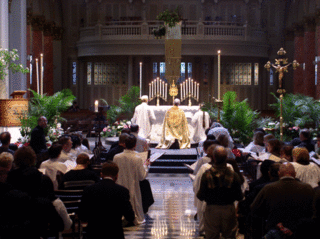
Back in the bad old days, the 70s, it was a commonplace of sueprficial humanism to sport the motif: "The Glory of God is Man Fully Alive!" and to cite the sentiment as from St Irenaeus.
Word-order is more important in English than in Greek or Latin. In English, the terms on either side of the "is" feel directional: as if the point of God's Glory is to praise the fully developed and actualized and liberated human being. Sadly, this is reductionist, though appropriate to the reductionist 70s. Sadly, the supposedly fully-developed human being is neither fully actualized nor liberated but only indulgent of selfishness, restrictive of love, agnostic of faith, despairing of hope, petty, silly, and trivial. But so were the 70s.
I'd like to return to the 70s--the 170s. When St Irenaeus truly proclaimed the destiny of human nature in the Glory of God as revealed through Jesus Christ. He sang--and what a difference a good translation makes!--about Glory and Man thus: "The Glory of God gives life, and those who see God receive life. . . .The actualization of life comes from participation in God, while participation in God is to see God and enjoy His Goodness . . . .Life in Man is the Glory of God, and the life of Man is the Vision of God."
The same is said by Pope John Paul the Great in Redemptor Hominis, which sings of a truly rich and beautiful humanism, in which Jesus Christ is the Truth and Beauty and Goodness of Man!
No comments:
Post a Comment